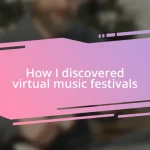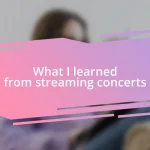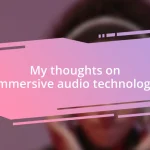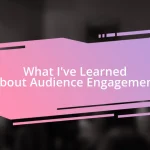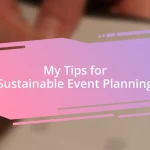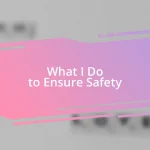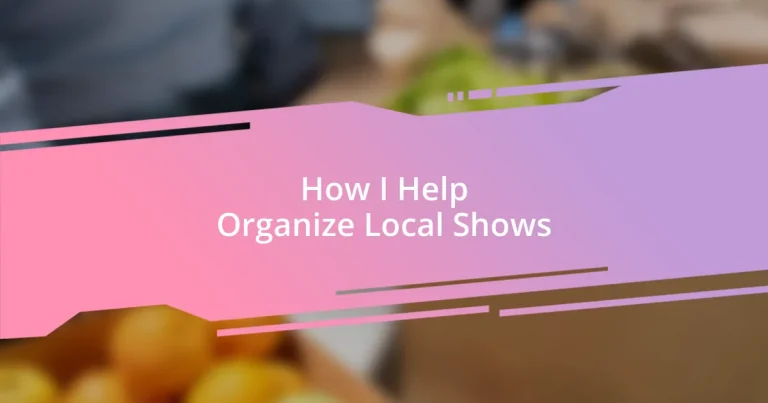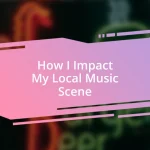Key takeaways:
- Understanding the needs of the community and performers is crucial for successful show organization, enhancing engagement and creativity.
- Effective planning and logistics, including backup plans and transportation, are essential to ensure smooth operations during events.
- Engaging the community through collaboration and feedback fosters a sense of belonging and enhances the overall event experience.
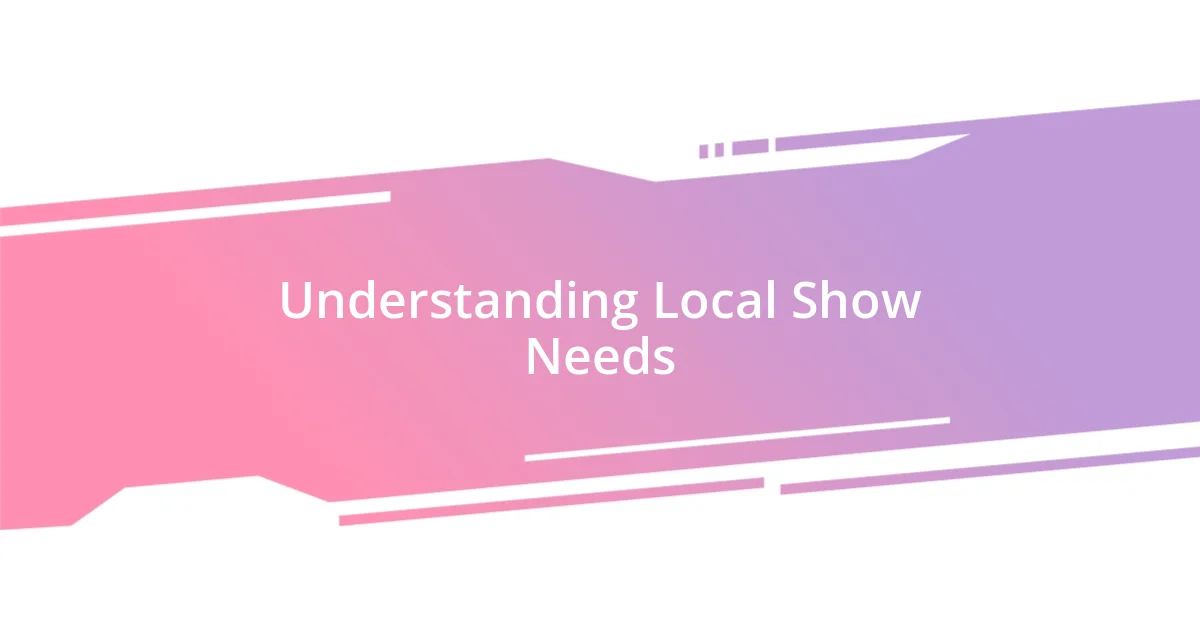
Understanding Local Show Needs
Understanding the needs of local shows is essential for creating events that resonate with the community. During my first show organization experience, I noticed how the venue’s layout significantly impacted audience engagement. Have you ever been to a show where the sound was off or the seating was awkward? Those small details can make or break the overall experience.
Having conversed with local artists, I found that catering to their specific needs is just as crucial. For example, one talented musician shared that a lack of adequate rehearsal space caused a lot of stress before their performance. Understanding such individual requirements not only helps in planning but fosters a supportive atmosphere for creativity. What happens when we overlook these needs? I’ve seen firsthand how it can dampen the enthusiasm of both performers and attendees.
Moreover, community involvement plays a vital role. I once organized a show that took feedback from local residents, and the turn-out was extraordinary! Their suggestions made the event more relatable and exciting. When you tap into what the community desires, you create not just an event but a memorable experience that they’ll cherish. How do you think your local community would respond to being involved in planning?
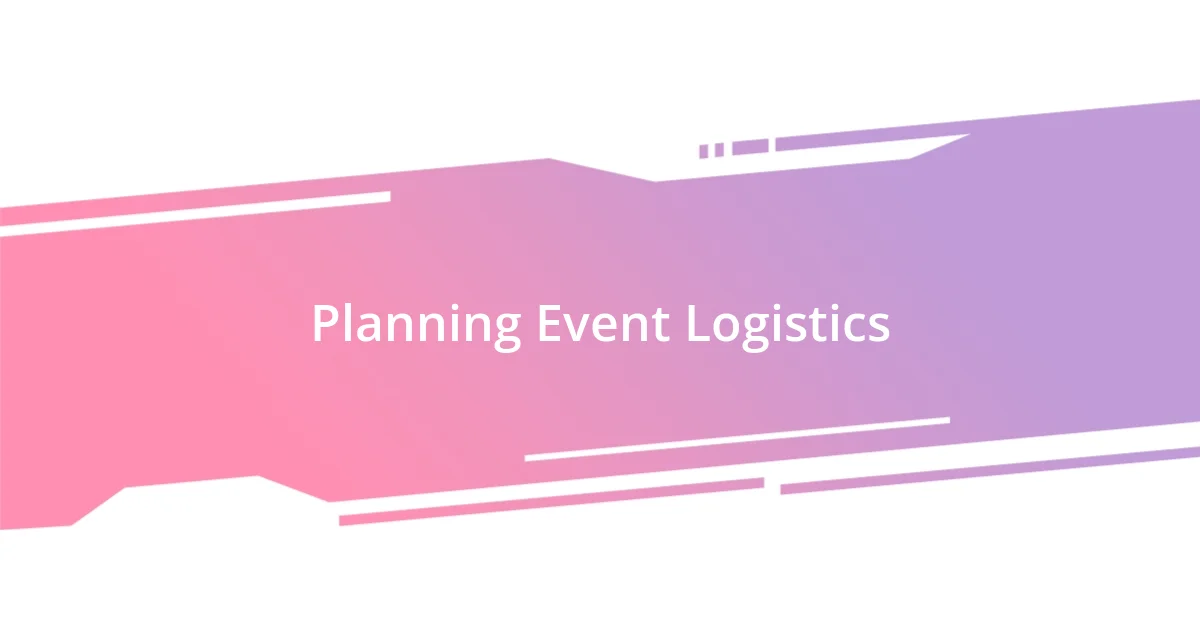
Planning Event Logistics
When planning event logistics, I’ve learned that every detail matters. For instance, while organizing an outdoor concert last summer, I discovered the importance of backup plans. We experienced an unexpected downpour just hours before the show. Luckily, I had secured a tent, which transformed what could have been chaos into a seamless experience. Can you picture the relief in everyone’s faces when we announced the venue change, and the music still went on?
The equipment rental process can also be a pivotal point in logistics. In my experience, I’ve encountered rental companies that lacked professionalism, which added unnecessary stress. For example, there was a time when the sound system showed up late for an art exhibition I organized. The soundcheck became a frantic race against the clock, and while we made it work, I learned how vital it is to communicate expectations clearly and have a backup sound system on standby. Have you ever faced a similar rush to get things ready in time?
Additionally, transportation for performers can’t be overlooked. I mistakenly assumed artists would manage their rides, but I soon realized many didn’t know the area well. During one event, I arranged a dedicated shuttle service, which not only eased their anxiety but also fostered relationships among the artists. When I saw them laughing and chatting on the bus, I knew that investing in logistics created a sense of community before the show even began.
| Logistics Element | Impact on Event |
|---|---|
| Backup Plans | Mitigates risks, ensuring the show goes on smoothly |
| Equipment Rentals | Keeps the flow of the event; professional service reduces stress |
| Transportation for Performers | Builds community and eases anxiety, enhancing engagement |
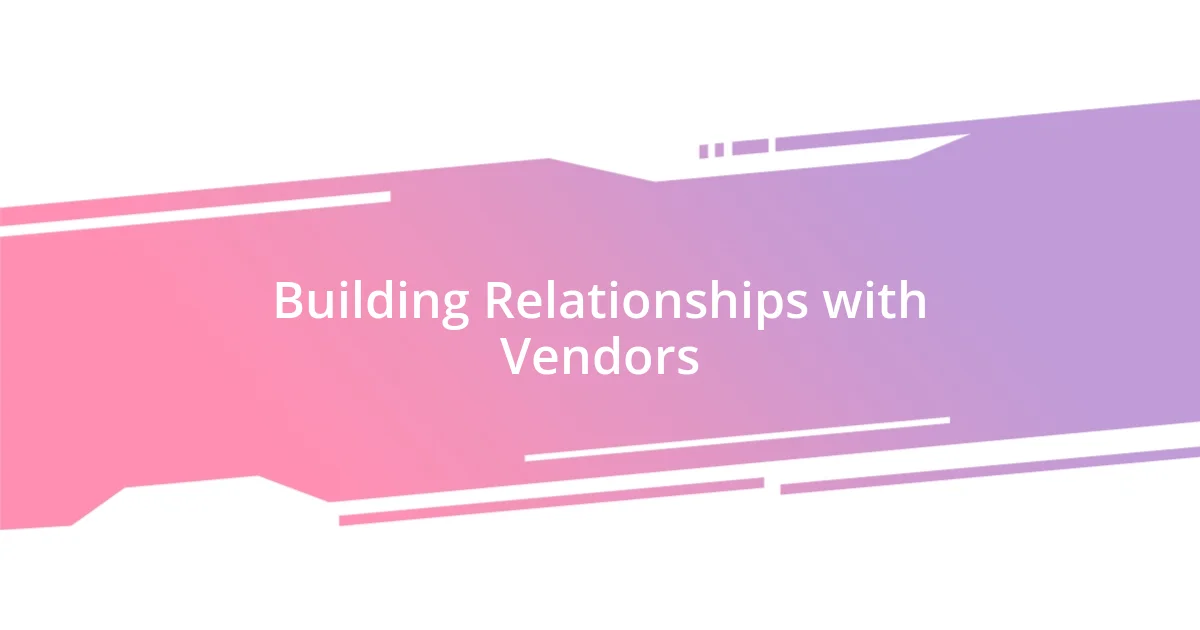
Building Relationships with Vendors
Building relationships with vendors is crucial to the success of any local show. I remember my first collaboration with a local catering company; they were hesitant at first but quickly became our biggest advocates. Establishing that trust helped not only in negotiating better deals but also in ensuring top-notch service on the event day. When vendors feel valued, they are more likely to go above and beyond to contribute to the event’s success.
- Regular check-ins and open communication create a supportive atmosphere.
- Offering them promotional opportunities at your event builds a mutually beneficial relationship.
- Show appreciation by recognizing their efforts publicly, which enhances their investment in your event.
- Collaborating on planning allows for shared insights that can elevate the overall experience.
The emotional reward of cultivating these relationships is immense. At one show, I had a vendor surprise me by creating a unique menu inspired by our theme. The joy on the faces of the attendees as they indulged in those personalized offerings was unforgettable. It’s these connections that transform a simple transaction into a thriving partnership, ultimately enhancing the community spirit we strive to foster.
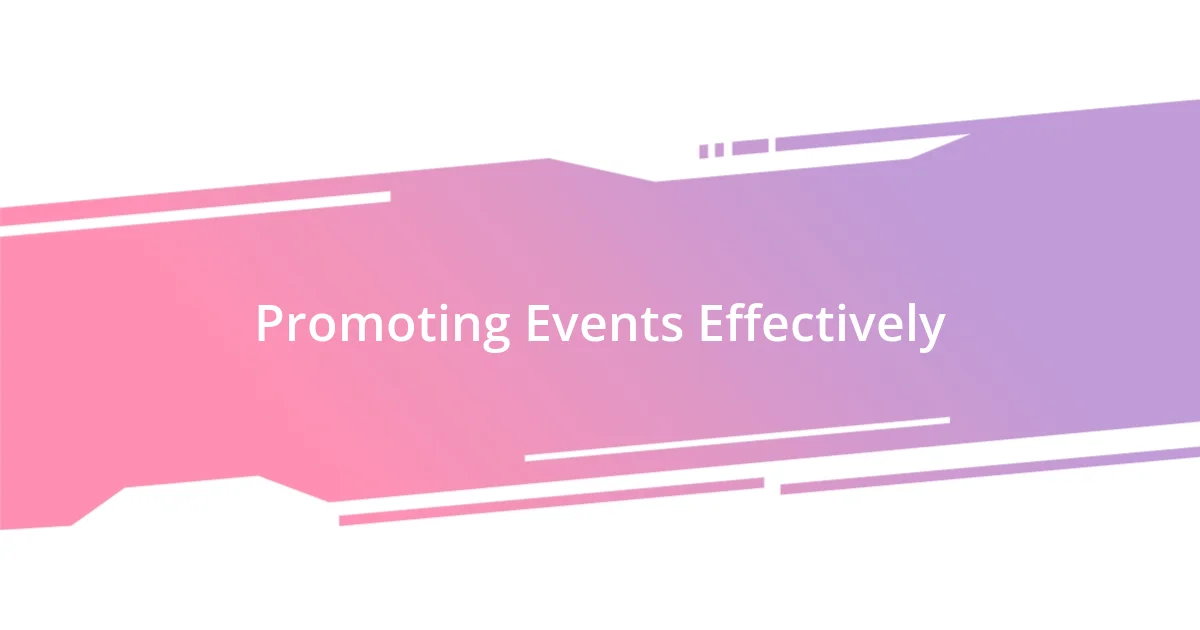
Promoting Events Effectively
Effective promotion can truly make or break a local show. I once tackled the daunting task of marketing an indie film festival, and I quickly realized that social media was my best friend. With targeted ads and engaging posts, I witnessed firsthand how these platforms fostered interactions and excitement. Have you ever been part of a conversation sparked by a well-placed tweet? I have, and it felt amazing to see people sharing our content and rallying around the event.
I’ve also found that community partnerships can amplify outreach significantly. During a local music festival, I collaborated with nearby businesses to create cross-promotional opportunities. The coffee shop down the road offered discounts to attendees with event tickets, which not only boosted foot traffic for them but also got more people talking about our festival. It’s incredible what happens when local entities come together. Isn’t it rewarding to think about the collective impact we can achieve?
Then there’s the matter of engaging visuals. For another event, I designed vibrant posters and flyers that captured the show’s essence. I even took the time to hand out some of these materials at a community event. Seeing people’s reactions, filled with enthusiasm and curiosity, reminded me how powerful a visual representation can be. It’s that spark of joy that reassures me we’re doing something meaningful in our community. How does it feel to witness your promotion efforts come to life through the excitement of others? For me, it’s an exhilarating experience every time.
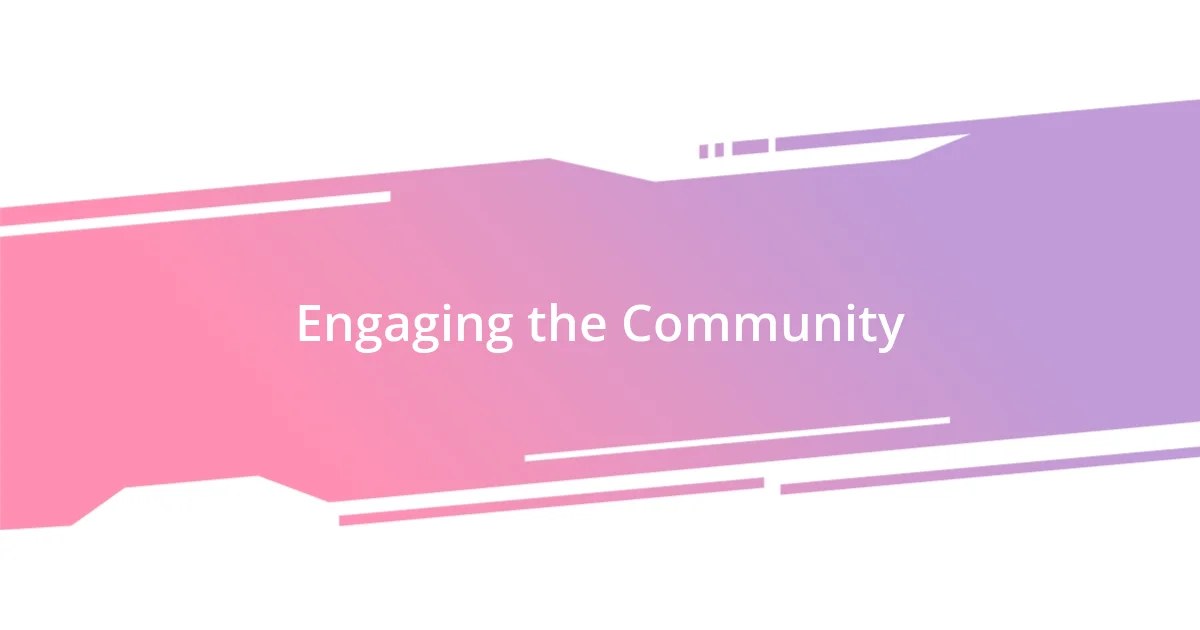
Engaging the Community
Engaging the community is at the heart of organizing successful local shows. I remember when I first proposed an art fair in our town; the initial response was hesitant, as many felt uncertain about its potential. By actively reaching out—hosting brainstorming sessions and gathering input—I was amazed at how quickly people opened up. It felt so rewarding to see their enthusiasm grow as we collectively envisioned the event.
Creating spaces for local talent to shine can also draw people in. For one event, I invited local musicians to perform, turning our show into a stage for their artistry. Watching the crowd dance and cheer sparked an incredible sense of belonging in the community. Isn’t it something special to witness your neighbors take pride in their own talent? Every time I hear those tunes in the streets after the event, it reminds me that we’re not just showcasing art or talent; we’re fostering connection.
To take engagement a step further, I believe in involving local groups. Partnering with schools and local non-profits not only boosts attendance, but also creates an opportunity for wider participation. I’ll never forget how the local high school’s drama club performed a skit at an event, drawing in families who might not have come otherwise. Their laughter and excitement were palpable, and it made me realize how much community collaboration can enhance not only attendance but also the spirit of the event. Engaging the community isn’t just a strategy; it’s the soul of what we do. Isn’t it heartwarming to think about the stories and experiences we help create?
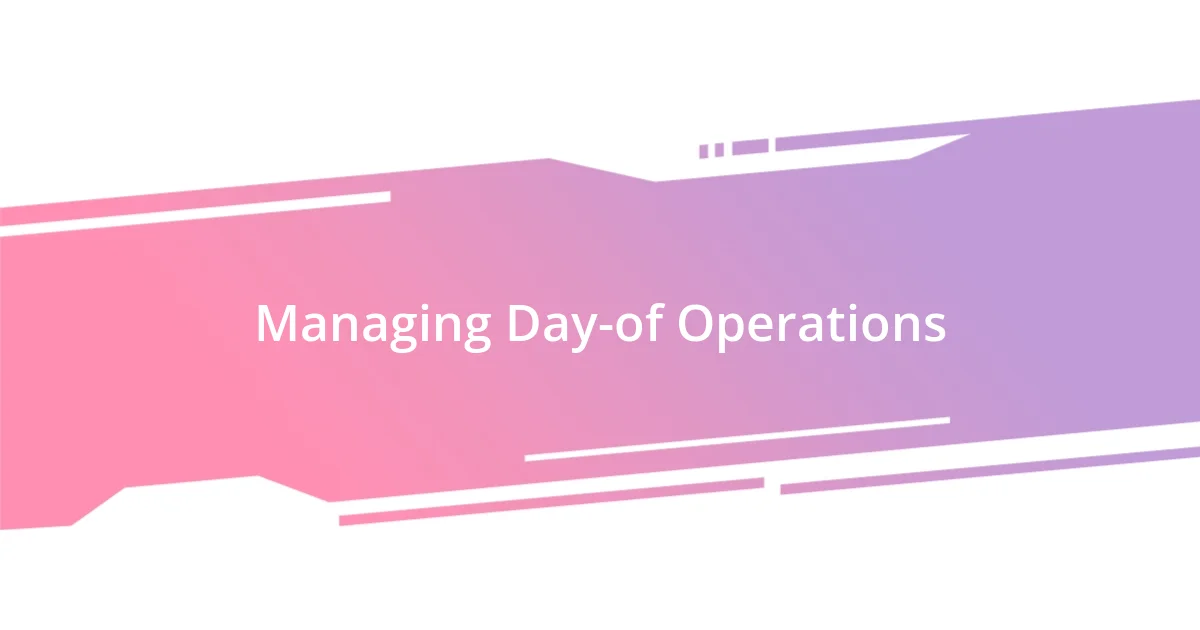
Managing Day-of Operations
Managing the day-of operations is crucial to ensure smooth execution. The first time I organized a local show, I learned just how important a detailed schedule could be. I mapped out every moment, from vendor arrivals to performance start times, and it made a world of difference. How satisfying is it to watch everything flow like clockwork? It feels like orchestrating a symphony where every note matters.
I often assign specific responsibilities to volunteers, creating a sense of ownership and accountability. I once had a volunteer who was initially nervous about handling tickets, but with some guidance, they thrived. By the end of the day, they were beaming with pride, and that sense of accomplishment was incredibly fulfilling for all of us. It’s those small victories that remind me how capable we are as a team. Have you ever seen someone go from hesitant to confident in their role?
Communication is another essential aspect of managing operations. During one event, we experienced a sudden weather change that threatened to dampen the mood. With quick updates relayed to each team member, we adjusted plans, and I ended up leading a spontaneous indoor activity that ended up being a hit! These moments of adaptability bring excitement and teach us to embrace the unexpected. Have you ever had to think on your feet in a chaotic situation? For me, it turns every challenge into an opportunity for creativity and connection.

Evaluating Success After Events
As the dust settles after an event, I find evaluating its success to be one of the most enlightening processes. I usually start by gathering feedback from attendees and volunteers, which can reveal unexpected insights. For instance, after a talent show, I was surprised to hear some audience members emphasize the importance of showcasing diverse acts. Aren’t those perspectives invaluable? They guide me in shaping future shows to better resonate with our community’s interests.
Analyzing ticket sales and attendance numbers also gives me a clearer picture. During one art fair, I noticed a sudden spike in ticket sales just a few days before the event. Curious, I traced it back to a local influencer who had shared our event on social media. This experience taught me the power of community promotion. Do you ever wonder where the most significant impact comes from? Sometimes, it’s those small, unexpected moments that illuminate the path for future success.
Moreover, I reflect on the overall atmosphere and engagement during the event. One time, while walking around a food festival, I overheard conversations bubbling with excitement. The laughter, the clinking of cups, and the warm smiles told me everything I needed to know about that day’s triumph. Isn’t it amazing how a feeling can often speak louder than numbers? I make it a point to take note of these emotional nuances—they add layers to my understanding of what truly matters to our community.
